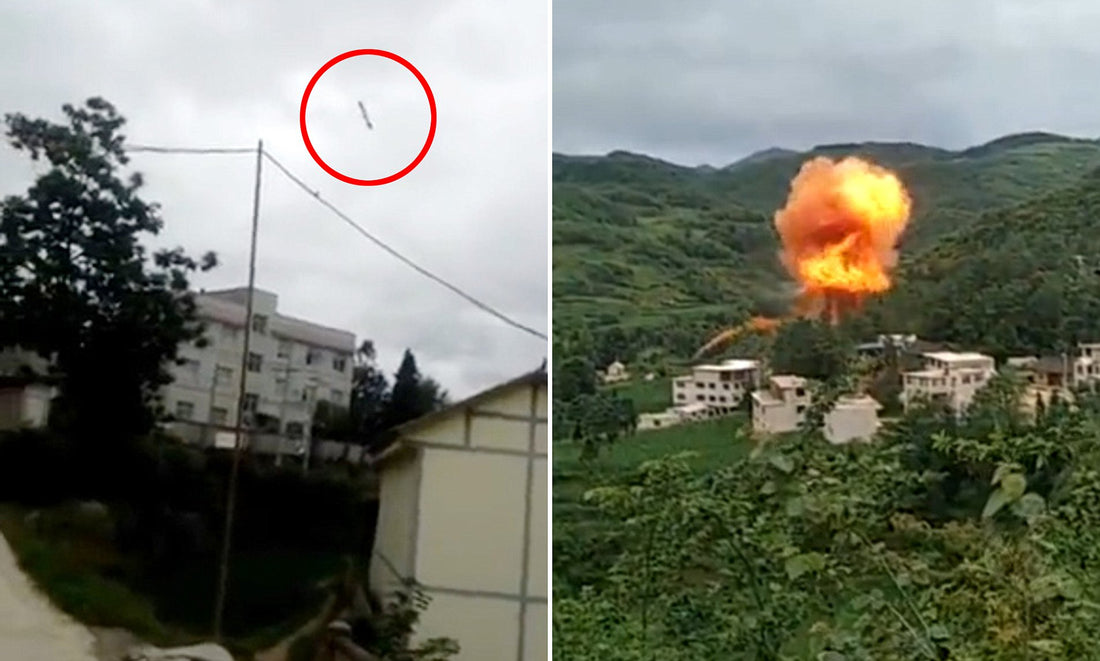
What If Space Junk Falls On You? Your Legal Rights Explained.
Share
Alas, we have been prodded into answering a question about the depp unknown...
Albeit, this one is quite close to home. But perhaps, not too close, we shjould hope.
Let us begin: Ask ARSE!
"Hey gang I got a cheeky question for you all. What happens if space junk falls on me?"
Well, a good question and not unlike the question, the answer is also close to home. As in, most legislation on Earth currently would apply to international countries dropping something on you. But, falling space junk is a real issue and will continue to worsen with every launch.
And to drop a bombshell on you (or a NASA rocket casing)...
Someone has been hit by space junk.
And lived to tell the tale.

Lottie Williams, recognised as the only individual to be struck by space debris.
Meet Lottie Williams - the only recorded person in history to get hit by falling space junk. In January of 1997, she and two friends were walking through a park in Tulsa, Oklahoma around 3:30 a.m. when they saw a huge fireball streaking from the skies.
“We were still walking through the park when I felt a tapping on my shoulder,” Williams explained. With no one near her at the time, she started to run, thinking a stranger had appeared out of the shadows. Then she heard something hit the ground behind her.
“The weight was comparable to an empty soda can. It looked like a piece of fabric except when you tap it, it sounded metallic."
Her discovery got her introduced to the astronomy club and the National Weather Service - who told her a Delta II rocket had re-entered the atmosphere the night before.
Having realized what had happened, Williams took the piece to the University of Tulsa, where Dr. Winton Cornell, an applied associate professor in the Department of Geosciences, examined it under an electron microscope and hit it with X-rays.
“It had been partly melted and resembled fiberglass. It appeared to be the kind of material NASA used to insulate fuel tanks,” Cornell said.
Williams then sent it to CORD (the Center for Orbital and Reentry Debris Studies), where further analysis confirmed it was a fuel tank from a Delta II rocket that had launched a U.S. Air Force satellite in 1996.
Williams is now featured as the only individual to be struck by space debris that we know of.

Long March 3B Booster seen on fire shortly after crashing into a mountain.
Uncontrolled space junk from a Chinese rocket fell back into the Indian Ocean near the Maldives on 8 May 2021.
Another Chinese rocket fell into the ocean off the coast of West Africa in May 2020. We didn't know when or where either piece of space junk was going to hit, so it was a relief that neither hit land or injured anyone.
Any object in space that isn't functional is space debris.
When falling space debris makes the news, we’ve noticed that there are three questions the public always asks.
- Was it preventable?
- What would have happened if there had been damage?
- In a world where space activities and launches are increasing exponentially, how will new businesses be regulated?
In order for space law to be effective, it has to do three things. Regulations must prevent as many dangerous situations as possible. Second, you need to enforce compliance. Finally, we need laws that outline who's responsible if something goes wrong.
How do the current laws and treaties around space stack up? Space debris does OK, but interestingly, looking at environmental law here on Earth might give some ideas about how to improve the current legal framework.
What if space junk lands on your house?

Let's say the Chinese rocket crashed into your house while you worked, instead of landing in the ocean. Is there anything you can do under current law?
A government-to-government issue according to the 1967 Outer Space Treaty and 1972 International Liability Convention. States are responsible and liable for any damage caused by a spacecraft - even if it was caused by a private company.
If a space object or its component parts caused damage on the surface of the Earth or to normal aircraft in flight, your country wouldn't even need to prove someone did anything wrong.
Basically, if a piece of space junk from China landed on your house, your own country's government would make a claim for compensation through diplomatic channels and then pay you – if they chose to make the claim at all.
It's pretty unlikely that a broken satellite will land on your house, but debris has hit the ground. During the Soviet Union's early space program, the Cosmos 954 satellite fell into the Northwest Territories.
A nuclear reactor on board spread radioactive debris over a wide swath of land when it crashed. Over CAD$14 million was spent on cleanup by a Canadian-American team. Canada asked for CAD$6 million from the Soviets, but they only paid CAD$3 million.
It was the first and only time the Liability Convention has been used for a spacecraft from one country to crash in another. In this context, the Liability Convention led to four governing norms.
Each country has a responsibility to: warn other governments about debris, provide information about impending crashes, clean up any damage caused by the craft, and compensate your government for any injuries.
Nevertheless, if you owned a small satellite that got hit by space junk, you and your government would have to prove who was at fault. However, there isn't a global, coordinated system for space traffic management.
There are tens of thousands of tracked pieces of debris in orbit, and many smaller, untrackable pieces, so it'd be hard to figure out what destroyed your satellite.
Space Junk is the bigger issue.

The amount of artificial debris in Earth's atmosphere is exponentially increasing.
So far, the space law has worked because issues have been few and far between. As more and more spacecraft take off, the risk to property and lives will increase, so the Liability Convention will be more important.
A busy sky isn't just about risks to life and property. As much as launch providers, satellite operators, and insurance companies care about space debris, space sustainability advocates argue that space is valuable and faces a greater risk of harm than people on Earth.
Pollution or mismanagement of the Earth's environment is bad because of its negative impact on the environment or living things. It's the same with space, even if there's no direct victim or physical harm.
In the Cosmos 954 case, the Canadians argued that since the Soviet satellite deposited hazardous radioactive debris on Canadian territory, it was "damage to property", as defined in the Liability Convention.
Since Article 2 of the Outer Space Treaty says no state can own outer space or celestial bodies, it's unclear whether this interpretation would apply in the event of harm to objects in space. We're moving into a new frontier where the tragedy of the commons can play out.
The best place for governments to start would be removing large objects from orbit that could collide. However, if the UN or governments agree on laws that define legal consequences for creating space debris and punishment for not following best practices, then that might help mitigate future pollution.
Laws like that wouldn't need to be invented from scratch. It's already in the 2007 United Nations Space Debris Mitigation guidelines. There are some countries that have made these guidelines into national laws, but worldwide implementation isn't yet happening, and there's no legal consequence for not following.
What if you get hit by space junk?
Unless you're extremely lucky like Lottie Williams...
You’d be especially dead.
And the proceedings would be none too different from what you’d expect if a foreign plane crashed on you.
Thankfully, the chances of someone getting hurt by a falling satellite are pretty slim. Even if it happens, current space law has a pretty good framework for handling it.
But just like in the early 20th century on Earth, current laws focus on the individual and ignore the bigger picture, even if it's a cold, dark and unfamiliar one.
Space law needs to be modified and enforced so that it prevents and deters actors from polluting the space environment - and holds them accountable - to avoid a trash-filled sky.
What would you do if you were hit by a rocket?
Let us know in the comments.
And if you’re feeling generous…
Share with an astro friend to spread ARSE and thrust Australia into the deep unknown…
#Space_Aus




